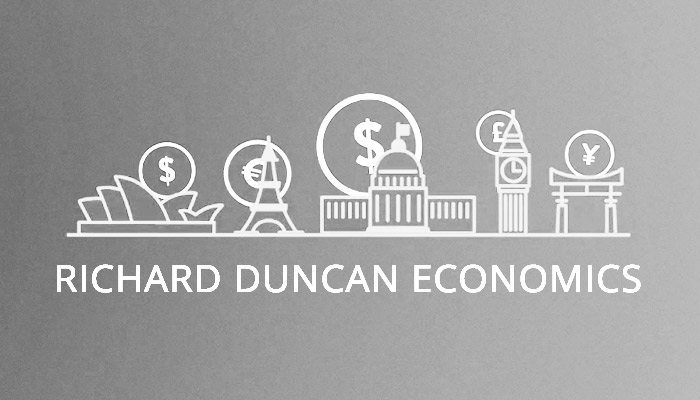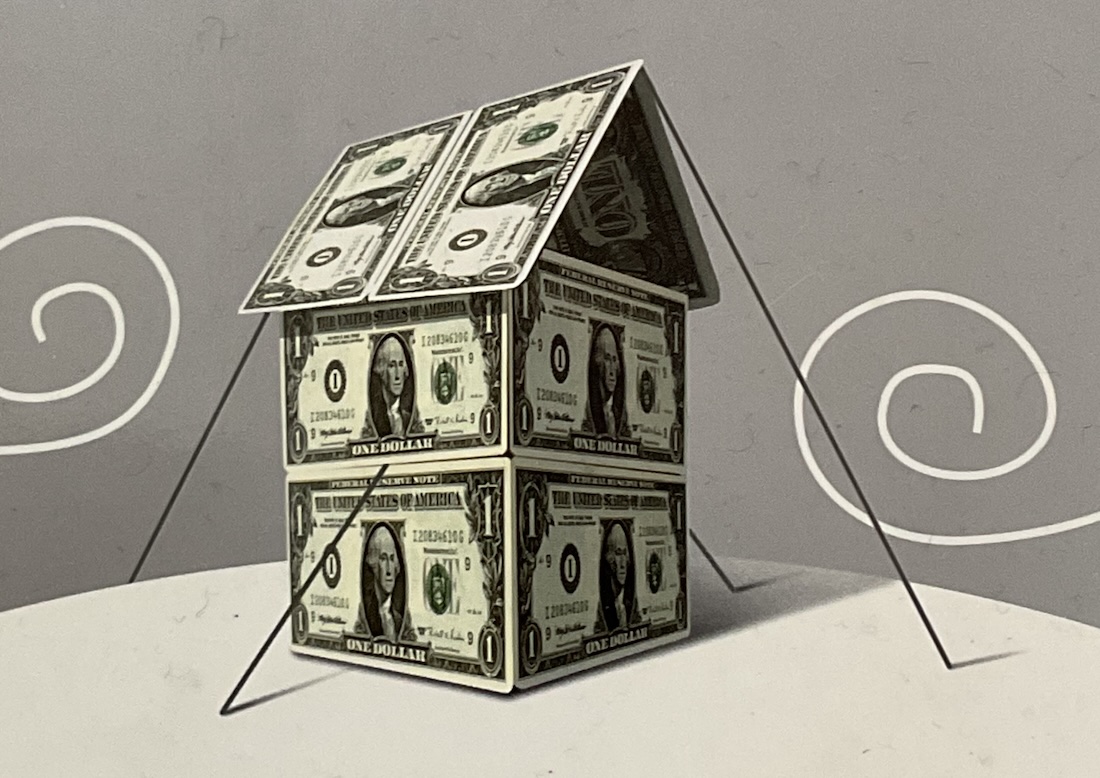QE Is Debt Cancellation

Posted February 17, 2015
When a central bank prints money and buys a government bond, it is the same thing as cancelling that bond (so long as the central bank does not sell the bond back to the public). That means governments have far less debt than is generally understood. It also has very important policy implications.
The new Macro Watch video, QE Is Debt Cancellation, explains in detail how the US central bank earns vast profits on its bond portfolio – and then hands those profits over to the US government, thereby reducing the government’s budget deficit every year. Last year, the Fed gave the government $99 billion. It has given the government $500 billion since 2008.
We also look at what this means for other countries.
The Bank of England owns 26% of all UK government debt. That means the ratio of government debt to GDP is not 84% as it is reported to be. It is actually 58%. This reality completely undermines the case for growth-retarding austerity in the UK.
The Bank of Japan owns Japanese government bonds equivalent to 22% of Japan’s GDP. When it is understood that QE is debt cancellation, the BOJ’s very aggressive Quantitative Easing program makes sense. It may be the only way to prevent a fiscal crisis in Japan.
The European Central Bank’s plans to create €1.1 trillion over the next 20 months will effectively cancel the combined budget deficits of the Eurozone national governments in both 2015 and 2016, with a considerable amount left over.
Quantitative Easing has only been possible because it has occurred at a time when Globalization is driving down the price of labor and industrial goods. The combination of fiat money and Globalization creates a unique moment in history where the governments of the developed economies can print money on an aggressive scale without causing inflation.
They should take advantage of this once-in-history opportunity to borrow more in order to invest in new industries and technologies, to restructure their economies and to retrain and educate their workforce at the post-graduate level. If they do, they could not only end the global economic crisis, but also ensure that the standard of living in the developed world continues to improve, rather than sinking down to third world levels.
If you are a Macro Watch subscriber, log in and watch QE Is Debt Cancellation now.
If you have not yet subscribed, join here:
http://richardduncaneconomics.com/product/macro-watch/
For a special 50% subscription discount, hit the “Sign Up Now” tab and use the coupon code: income
You will find more than 14 hours of Macro Watch videos available to watch immediately. A new video will be added approximately every two weeks.


Richard – A suggestion for your site.
I have read your books and am interested in your views on the global economy. However I would be interested in watching a selection of you Macro Watch video’s. Would it be possible to subscribe to individual video’s rather than an annual subscription?
Regards, Andrew Miles.
Thank you again Richard for another revealing insight. I am left to ponder the implications if this revelation were to be brought to the attention of the world at large. What would be the consequences of everyone “daring to recognize” the fact that government debt purchase is debt cancellation? Great, free money? or a jolt to inflation psychology? I am looking forward to hear what more you have to say about inflation in your next lecture.
Richard,
Watching your current video left me just a bit puzzled. You state that the Fed sells the newly printed “currency” to the banks, then takes the “cash” they receive from the banks and buys Treasuries. Here is the confusing part – what is the difference between “currency” and “cash”? I understand that “cash” could include things other than U.S. currency, but even in that case, these other things would need to be converted to U.S. currency before it could be used to buy Treasuries.
Jeronimo,
You’re right to question this part of the talk. If you read the quoted web page at the Fed, it seems clear that they are using “cash” and “currency” synonymously. All it is saying is that banks can convert their deposits with the Fed into cash, and vice-versa.
The line in red: “And the Fed, takes the proceeds and buys Government bonds.” is not on the Fed’s web page, and doesn’t really make sense, since the Fed does not need proceeds in order to buy government bonds. As I believe you are aware, in order to buy government bonds, the Fed could simply create a new deposit in the government’s account in exchange for the government bonds. It does not do this because it is not allowed to buy directly from the government. Instead it buys them from banks (by creating new deposits for the banks), and the banks use those deposits to buy new bonds from the government. The effect is the same, except that the banks take a cut.
Richard,
If in fact the Fed were to cancel the government debt, wouldn’t this require a restructuring of the Fed’s balance sheet? I realize that the cancellation would need to be reflected as a reduction of the Fed’s assets offset by the reduction of the Treasuries liabilities. But from the Fed’s perspective, this would need to reflected as a reduction in the equity position (of the Government – Treasury).
Also, you have mentioned several times that the fiat money creation should be used for investment in beneficial projects. However, if you were to point out to the politicians that this QE program is essentially debt cancellation, and that we could continue to spend without the fear of inflation or of an over-burdensome debt overhang, isn’t it more likely that there would be a bigger push for social benefits – which in most cases are not revenue generating?
Finally, there has been some talk about Russia and China wanting to go back on the gold standard. I know that the gold standard would be extremely limiting in terms of economic growth compared to the free-wheeling fiat money / credit growth environment. But would this be possible? If so, what would that do to the U.S. economy?
Richard,
Regarding the FED as the US Central Bank, I wonder if they could in fact write-off the Treasuries they have purchased. I was mistakenly under the impression that the FED was a governmental agency. In fact, they are privately owned by the member banks. They could continue to carry the Treasuries indefinitely, but I would not think they could simply write them off. Am I wrong?
You are right. They cannot simply write them off, since their net worth would suffer by the amount written off. The government would then be required to recapitalise the Fed, leaving it (the government) in exactly the position it was in before the Fed wrote off the Treasuries.
If you combine the government and Fed together, you could say that the debt from government to Fed is cancelled out (asset on Fed’s balance sheet, liability on government’s), but the Fed’s liabilities which it created when it bought the Treasuries (the deposits/cash) are still outstanding from the combined entity.
By the way, it’s not quite as simple as the member banks owning the Fed. They receive a dividend on their ownership, but Richard is right that the vast majority of the profits of the Fed are remitted to the US Treasury.
“”When a central bank prints money and buys a government bond, it is the same thing as cancelling that bond (so long as the central bank does not sell the bond back to the public).””
‘the same thing’ ?
To whom?
Let’s say for instance you were Treasury, and your securities freely traded in markets that caused you (Treasury) to pay fixed interest for a fixed period to the holder of the security and to pay off the principal of that security to the holder at maturity.
Per the hypothesis, the private federal reserve bank-corporation now purchases that security from a willing seller, providing reserves to the banking system in the amount of the security.
But the Treasury’s obligation to pay the interest, and to refund the obligation, remains. For the Treasury the purchase by the private bankers is not the same as cancelling any of Treasury’s obligations, The fact that the FR banks re-pay that interest to the Treasury mainly raises the question of why the Treasury borrows money for its public needs in the first case.
There is public gain available from having the Treasury directly issue more of the nation’s money in real circulating media that is not based on debts and capital (public debt) markets.
The amount of that public gain would be limited to the amount of new money needed to achieve GDP potential. Anything more would require draining the excess of monies through fiscal measures.
Sorry, but the realization of the money powers at hand do not readily portend more government borrowing , but less.
There is no reason for government to borrow that which it has the power to create and issue itself, through Overt Money Finance, or other substantive remedy.
http://www.group30.org/images/PDF/ReportPDFs/OP%2087.pdf
To whom?
To the government (and the American taxpayers), which effectively pays no interest on that debt.
The Treasury cannot issue money. Only the Fed.
R